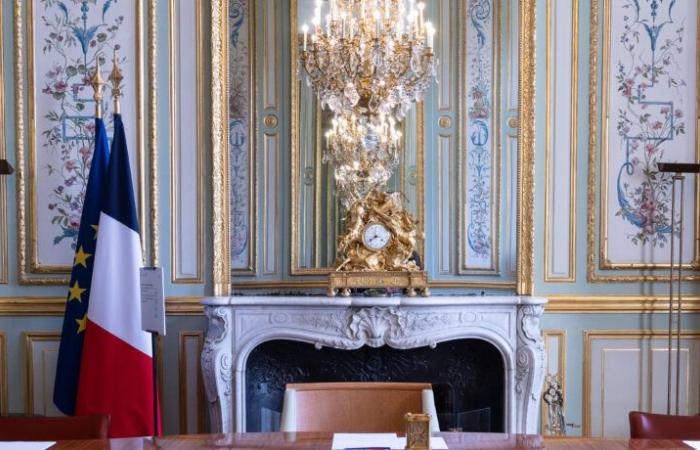As we write these lines, there is no longer much doubt that Michel Barnier’s government will fall through the adoption of a motion of censure in the National Assembly. To justify the contested choice of dissolution this summer, Emmanuel Macron had put forward the risk of government censorship at the time of the budget. This evening, his bet seems to have failed. After taking two months to appoint a Prime Minister, his government lasted barely longer and became the most ephemeral of the Fifth Republic. But above all, the situation of political deadlock is confirmed because no majority is emerging to govern in the months to come. “Even what is most robust in our institutions, the budgetary procedure, is crumbling,” observes Jean-Pierre Camby, associate professor at the University of Versailles Saint-Quentin and author of “Parliamentary work under the Fifth Republic” , (ed. LGDJ)
“The Fifth Republic is going through a trial by fire”
To understand how we got here, an initial consensus is emerging among jurists and historians. It lies in the “presidentialism” of our institutions.
And if for Jean-Pierre Camby, “the Fifth Republic is tired”, it is less the text of the Constitution which is in question, than the practice of power. “The concentration of power towards the executive is in its infancy in the text of 58 but everything thereafter has contributed to it. The constitutional revision of 2008 further stripped Parliament of its powers. Which resulted in what we have seen for several years: a President who takes care of everything”
“The Fifth Republic is going through a trial by fire. And as is often the case in these cases, its flaws come to light. Its main problem lies in the imbalance between: legitimacy, responsibility and power,” explains Marie-Anne Cohendet, professor of constitutional law at Paris 1 University. She continues. “In the Constitution, the balance is respected. The President of the Republic is the arbiter and guarantor of the proper functioning of our institutions, which is normal because he is irresponsible. By this I mean that he cannot be removed from power for political reasons. It is therefore up to the government to lead the nation’s policy, which is why it can be overthrown, because democracy and power are linked. But in practice, when a President of the Republic has a majority, he encroaches on the powers of the government, even though he is irresponsible. This is what brings anger to public opinion. Some are calling for the resignation of Emmanuel Macron while legally, this question is out of play.
“The Sixth Republic induces parliamentary deliberation and the current political class is not capable of it”
“The Constitution was precisely built on the idea that it was necessary to give the executive the means to manage the country. This is its great merit,” underlines Julien Bonnet, professor of public law at the University of Montpellier, who recalls that the parliamentary regime of the Fourth Republic had been accused of not having known how to manage the Algerian crisis. The Third Republic had been accused of the debacle of 1940. “The difficulty our regime is going through is that this imperative, the management of the country, ended up creating a democratic malaise. Citizens believe less and less in the legitimacy of national representation. And if you add to this institutional problem, a global ideological context conducive to illiberal excesses, we find ourselves with a double penalty.”
Should we then reform our institutions, give more power to Parliament, by moving, for example, to a Sixth Republic, as requested by LFI elected officials? “It’s very French to think that by changing our institutions, things would work better. It’s a mirage. The Sixth Republic projects which want to rehabilitate parliamentary deliberation are carried by La France Insoumise deputies. The same people who consider compromises to be compromises. We also seem to forget the immense unpopularity of the Fourth Republic marked by its parliamentary instability. General de Gaulle used to say that the Constitution of the Fourth Republic was bad, but that the political personnel were good. It would rather be the opposite today,” replies David Bellamy, lecturer in contemporary history, specialist in political and parliamentary history, who advocates full application of the Constitution of the Fifth Republic. “The Sixth Republic induces parliamentary deliberation and the current political class is not capable of it”
Change of calendar, constructive mistrust: avenues for reforming our institutions
Another reform of our institutions is put forward by Jean-Pierre Camby. “We must return to this calendar which consists of voting for a President and a month later, for the deputies. This brings the Elysée to control everything.” A measure regularly mentioned in the news would consist of a return to proportional representation in legislative elections. “From a cyclical point of view, it would freeze the current balances. The majority would remain untraceable. From a structural point of view, proportional would distort the link between voters and elected officials,” he considers.
“The composition of the current Parliament already resembles a proportional election. It is a fairer method of election, even if it carries with it the potential for instability. Conversely, the majority vote gives a magnifying glass effect on the winner which could ultimately benefit the RN,” believes, on the contrary, Marie-Anne Cohendet. The professor of public law outlines several avenues to strengthen the balance of powers. “A Prime Minister elected by parliamentarians, as is done in Germany, could partly resolve the legitimacy problem. From across the Rhine, we could also draw inspiration from what we call constructive distrust which consists, for deputies, of not being able to overthrow a government if they do not have the capacity to elect another.”
Another reform put forward by Julien Bonnet would consist of returning to the election of the President of the Republic by direct universal suffrage established in 1962. Which would lead, according to him, to facilitating a change in political culture based “on the myth of ‘providential man’. “We are no longer in the 60s. The political legitimacy of political personnel is failing. A President of the Republic who is not responsible fuels disappointment and anger and leads to an anti-system vote,” he concludes.






